- Home
- Patrick O'Brian
H.M.S. Surprise Page 16
H.M.S. Surprise Read online
Page 16
In the dead hour of the middle watch he appeared on deck in his night-shirt, looked attentively at the log-board by the binnacle-light, and desired Pullings to shorten sail at eight bells, He appeared again, like a restless ghost, at five bells, and backed his topsails for a while. His calculations were remarkably exact, and he brought the frigate into Rio just as the sun rose behind her and bathed the whole fantastic spectacle in golden light. Yet even this did not answer: even this did not close the breach: Stephen, on being routed out of bed to behold it, observed 'that it was curious how vulgar Nature could be at times—meretricious, ad captandum vulgus effects—very much the kind of thing attempted to be accomplished at Astley's or Ranelagh, and fortunately missed of'. He might have thought of other observations, for the sloth had been very slowly sick all night in his cabin, but at this moment the Surprise erupted in flames and smoke, saluting the Portuguese admiral as he lay there in a crimson seventy-four under Rat Island.
Jack went ashore with Mr Stanhope after breakfast, his bargemen shaved and trim in sennit hats and snowy duck and himself in his best uniform; and when he came back there was not the least trace of reserve, propitiation or hauteur in his expression. Bonden was carrying a bag, and from far off the cry of Post went round the waiting ship.
'Captain's compliments and should be happy if you could spare him a moment,' said Church, the rattivore. Then grasping Stephen's sleeve he added in an urgent whisper, 'And sir, please, please would you put in a good word for Scott and me to go ashore? We have deserved it.'
Wondering just how Mr Church thought he had deserved anything short of impalement, Stephen walked into the cabin. It was filled with a rosy smile, with contentment and the smell of porter; Jack sat there at his table behind a number of opened letters from Sophia, two glasses and a jug. 'There you are, my dear Stephen,' he cried. 'Come and drink a glass of porter, with the Irish Franciscans' compliments. I have had five letters from Sophie, and there are some for you—from Sussex too, I believe.' They were lying on a heap of others addressed to Dr Maturin, and the hand was undoubtedly Sophia's. 'What a splendid hand she writes, don't you find?' said Jack. 'You can make out every word. And, really, such a style! Such a style! I wonder how she could have got such a style: they must be some of the best letters that were ever wrote. There is a piece here about the garden at Melbury and the pears, that I will read to you presently, as good as anything in all literature. But do not mind me, I beg, if you choose to look at yours now—do not stand on ceremony.'
'I will not,' said Stephen absently, putting them into his pocket and shuffling through the rest—Sir Joseph, Ramis, Waring, four unknowns. 'Tell me, were there any letters for Mr Nicolls?'
'Nicolls? No, none. Plenty for the rest of the gun-room, however. Killick!'
'What now, sir?' said Killick angrily, with a spoon in his hand.
'Gun-room steward: post. And bring another jug. Stephen, just look at this, will you?' He handed a letter: Mr Fanshaw presented his compliments to Captain Aubrey, and had the honour to state that he had this day received the sum of £9,755 13s 4d from the Admiralty, representing an ex gratia payment to Captain A in respect of the detention of His Most Catholic Majesty's ships Clara, Fama, Medea and Mercedes; that their Lordships did not have it in contemplation to make any payment of head-money or gun-money, nor for the hulls; and that the above-mentioned sum, less sundry advances as per margin and the usual commission, had been paid into Captain A's account with Messrs Hoare's banking house.
'It is not what you would call handsome,' said Jack laughing, 'but a bird in the hand is worth any amount of beating about the bush, don't you agree? And it pretty well clears me of debt: now all I need is a couple of moderate prizes, and then upon my word I cannot see what Mother Williams can possibly object to. To be sure, there is not a smell of a merchantman left this side of Batavia; not lawful prize, I mean, and God preserve me from sending in another neutral; but still, they have some privateers cruising from the Isle of France, and a brush with one or two of them . . .' The old eager piratical gleam was in his eye; he looked five years younger. 'But Stephen, I have been thinking about you. I must heave the ship down, re-stow her—Mr Stanhope's dunnage and presents are all ahoo in the after-hold—get her more by the head, shift all manner of things; and it occurred to me, now you are so amazing agile, should not you like to take a week's leave and ride into the interior? Jaguars, ostriches, unicorns—'
'Oh Jack, how truly good of you! I had to put violence upon myself to come away from Cape St Roque, to abandon that vegetable magnificence. The Brazilian forest is the haunt of the tapir, the boa, the peccary! You may find it hard to credit, Jack, but never yet have I beheld a boa.'
Boas he had beheld, and handled too; hummingbirds; fire-flies; the toucan in his glory, peering from his nest; the ant-cater and her child, tinted purple by the sunrise over a desolate swamp; armadillos, three kinds of New World monkey; a true tapir he had seen, before he came back to the ship at Rio, having worn three horses and Mr White, his companion, to a shadow. Here, riding at single anchor, he found a strangely altered Surprise, with a thirty-six gun frigate's mainmast, her fore and mizzen raked strongly aft, and her sides repainted black and white—the Nelson checker. 'It is a plan of my own,' said Jack, welcoming him aboard, 'something between the Lively and the old Surprise I knew as a boy. It will move her in light airs, with her narrow entrance, do you see, and above all give her an extra knot under a press of canvas. You are going to object to her top-hamper, I know'—Stephen was gaping up at an immature parrot—'but I have tossed out all my shingle-ballast and replaced it with pig-iron—I cannot tell you how kind the Admiral has been—and we have stowed it low. She is as stiff as—why, as stiff as you can imagine; and if we cannot get an extra knot I shall be amazed. We may need it, for Lyra was in, and she tells us Linois has passed into the Indian Ocean with a ship of the line, two frigates and a corvette. You remember Linois, Stephen?'
'Monsieur de Linois, who captured us in the Sophie? Yes, yes. I remember him perfectly. A cheerful, polite gentleman, in a red waistcoat.'
'And a prodigious good seaman, too; but if I can help it, he shall not catch us again, not in his seventy-four. The frigates are another matter: the Belle-Poule is a heavy great brute, forty guns to our twenty-eight, and twenty-four-pounders; but the Sémillante is smaller, and we should stand a chance with her, if only I can get our people to move brisk and fire straight. That would be something like a prize, eh? Ha, ha!'
'Do you apprehend any immediate danger? Have these vessels been seen at the Cape?'
'No, no, they are ten thousand miles away. They have come into the Indian Ocean by the Sunda Strait.'
'Then is it not perhaps a little premature to . . .'
'Not a bit, not a bit. Even from the service point of view, there is not a moment to be lost. The crew is not half worked up—nothing like the Livelies, not a patch on the Sophies; and then again, you know, I do so long to be married! The idea of being married drives a man, by God: you can have no idea. Married to Sophie, I mean: I beg pardon if I have spoke awkward again.'
'Why, my dear, I am no great friend to marriage, as you know; and sometimes I wonder whether you may not set too great a store on a contract compelling you to be happy—whether any arrival can amount to the sum of voyages—whether, in fact, it would not be better to travel indefinitely.' His own letters from Sophia told a wretched tale of persecution; Mrs Williams's health was really breaking up—the President of the College of Physicians and Sir John Butler were not men to be deceived by vapours or hypochondria, and there were some ugly; ugly symptoms—but her strong restless mind seemed to have gathered fresh energy. Sometimes touchingly pale and racked with pain (she bore real pain with great fortitude), sometimes her red, angry self, she was battering her daughter with Mr Hincksey, the new parson. In an exhausted voice from what she called her death-bed she would beg her daughter to give up this Captain Aubrey, who would never make her happy, who was going to India everyone knew why—who was
going to India after that woman—and to let her mother die in peace, knowing her safely married and settled in Swiving rectory, so near at hand, among all their connections, so comfortable, not in seaside lodgings the other end of England or in Peru; married and settled with a man all her friends approved, a man with handsome private means and brilliant prospects, a man who could make a proper provision for her and who would look after her sisters when their mother was gone—poor motherless girls! A man to whom Sophie was not indifferent, whatever she might say. Captain Aubrey would soon get over it, if indeed he was not over it already, in the arms of some trollop: as his precious Lord Nelson said, every man was a bachelor once he was beyond Gibraltar; and India was a great way beyond Gibraltar, if the atlas was to be believed. In any case, Admiral Haddock and every gentleman of the Navy she had ever known, all said 'Sea-water and distance wash love away'; they were all of the same opinion. She only spoke for Sophie's good; and she implored her not to refuse this one, this last request, for the sake of her sisters, even if her mother's happiness meant nothing to her.
Stephen knew Hincksey, the new rector, a tall, well-looking, gentlemanlike man; a sound scholar; nothing of the evangelical; amusing, witty, kind. Stephen loved and esteemed Sophie more than any woman he knew, but he expected heroic virtue in no one: not heroic virtue of long duration, with few allies and they ten thousand miles away. Ten thousand miles, and how many weeks, months, even years? Time meant one thing in an active, ever-changing life; quite another in a remote provincial house, cooped up with a strong woman devoid of scruple, convinced of her divine rectitude.
In any case, Mrs Williams's fear and detestation of debt was wholly genuine, and this gave her argument a strength and truth far beyond her ordinary reach; in her quiet, settled part of the country imprisonment—imprisonment!—for debt did not happen, and the shocking tales she heard from outlying regions or from the dissolute, giddy metropolis concerned only raffish adventurers or worse; though her whole childhood had been tinged by whispered apocalyptic accounts of people so abandoned by God as to have lost their capital in the South Sea Bubble. By her own efforts Mrs Williams, like all the people she knew, might have earned fivepence a day at weeding or plain sewing, though some of the gentlemen might have done a little better at haysel and harvest; the accumulation of a hundred pounds was utterly beyond their powers, that of ten thousand beyond their imagination; and they worshipped capital with an unshakeable, uncomprehending, steady devotion, not devoid of superstitious practices.
Stephen had reflected upon this at the time of reading Sophie's letters; he had reflected upon it as he walked in the Brazilian forest, gazing at vast cataracts of orchids and butterflies the size of soup-plates; he reflected upon it now. The infinitesimal time of thought! The interval was barely long enough for Jack's expression to change from embarrassment to a hint of puzzled anxiety, sensing the motive behind Stephen's words, before a message with the news of the launch putting off with Mr Stanhope aboard turned it to pleasure and relief. 'I was so afraid we should miss the tide,' he said, running up the ladder into the swarming anthill on deck. Swarming but orderly: whatever he might say about their being only half worked up, the Surprises moved about their preparations to get under way with diligent purpose; the Racoon was now forgotten, the landmen had left the plough and the loom far far behind; and in their battles ashore with the crew of the Lyra the frigate's libertymen had fought as a body—there was not a man whose straw hat did not fly a ribbon with Surprise embroidered on it.
The ceremony of reception—Mr Stanhope never came aboard incognito—the clash of the Marines presenting arms, the long-expected order 'Up anchor', the bosun's pipe, and the crunch of the soldiers' boots as they ran to their places at the capstan bars.
The spell on land, prolonged to the last possible minute, had restored Mr Stanhope's spirits; but, thought Stephen, looking into his face, it had not done a great deal for his health: it had also taken away his sea-legs. He and Stephen were discussing the official letters that had reached him from England and from India when the tide turned against the wind, and the Surprise, heading out to sea, began to caper like a rocking-horse.
'You will forgive me, Dr Maturin,' he said. 'I think I will lie down. I have little hope of its doing any good. I know that in an hour's time this cold salivation will reach its paroxysm and that I shall become an inhuman being, unfit for decent company for how long, oh Lord, how long?' Stephen stayed with him as long as human comfort was supportable, then left him to his valet and a bucket, observing, 'You will be better soon, very soon; you will grow accustomed to the motion far sooner than you did in the Channel, off Gibraltar, off Madeira; your sufferings will soon be at an end.'
Little did he believe it, however: he had read books of voyages, he had conversed with Pullings, who, sailing with the China-bound East-Indiamen, had made this trip several times; and he knew the reputation of the high southern latitudes. For this was not an ordinary passage to India; the Cape of Good Hope had been handed back to the Dutch with bows and smiles in the year two—clearly it would have to be taken from them again, but in the meantime the Surprise must run down far to the south of Africa, to the roaring forties, make her casting, and so northwards to the waters where the summer monsoon blew.
The frigate ran down the trades as though she were determined to make up for lost time; the difference in her sailing was apparent to everyone aboard—easier, faster, more stylish by far. Jack was charmed; he explained to Stephen that she was very like a thoroughbred mare—needed a light careful hand—had to be steered small—had beautiful manners on a wind and stayed like a cutter—but a captious fellow might fault her going large: a very slight tendency to steer wild, that called for great attention at the helm, to prevent her being pooped. 'I should be sorry indeed to see her pooped,' he said, shaking his head. 'Was she to broach to, I should not like to answer for that damned foremast yard; nor yet for the mast itself, the only thing I could not replace. You remember the partners, for example?' Stephen had a vague recollection of Jack striking a marlinspike into wood, and soft splinters flying; he, too, shook his head, looking grave; and in decency he paused a moment before asking 'when he might reasonably hope to see an albatross?'
'Poor dear,' said Jack, his mind still with his ship, 'I am afraid she is growing old: all the spirit in the world, but anno domini can't be beat. Albatross? Why, I dare say we may sight one before we reach the height of the Cape. I will put it in orders that you are to be told the moment an albatross is seen.'
Day after day the figure of the noon altitude rose: 26°16', 29°47', 30°58'; every day the air grew colder—guernsey frocks and fur hats were seen, pitiably reduced by their passage through the tropics, and the officers' uniforms were no longer a torment to them; and every day, several times every day, Stephen was called on deck to see mollyhawks, Cape pigeons, petrels, for now they were in the rich waters of the south Atlantic, waters that could and did support Leviathan, who might often be seen sporting in the distance—once indeed a bump in the night, a momentary check in the frigate's way, showed that they had come into immediate contact with him.
South and south for ever, beyond the zone where the trades were born, boring steadily through uncertain variable airs—cold, cold airs—towards the roaring forties, where the west wind, sweeping without a pause round the whole watery globe, would carry them eastwards beyond the tip of Africa. Week after week of determined sailing, with the sun lower at every noon, lower and as it were smaller: brilliant, but with no warmth in it: while at the same time the moon seemed to grow.
It was strange to see how quickly this progress took on the nature of ordinary existence: the Surprise had not run off a thousand miles before the unvarying routine of the ship's day, from the piping up of the hammocks to the drumbeat of 'Heart of Oak' for the gun-room dinner, thence to quarters and the incessantly-repeated exercising of the guns, and so to the setting of the watch, obliterated both the beginning of the voyage and its end, it obliterated even time, so that
it seemed normal to all hands that they should travel endlessly over this infinite and wholly empty sea, watching the sun diminish and the moon increase.
Both were in the pale sky on a memorable Thursday when Stephen and Bonden resumed their customary places in the mizzentop, dismissing its ordinary inhabitants and settling down upon the folded studdingsails. Bonden had graduated from pot-hooks and hangers far north of the line; he had skimmed his ignoble slate overboard in 3°S; now he was yardarm to yardarm with pen and ink, and as the southern latitude mounted, so his neat hand grew smaller and smaller and smaller.
'Verse,' said Stephen. It was an inexpressible satisfaction to Bonden to write in metre: with a huge childish grin he opened his inkhorn and poised his attentive pen—a booby's quill.
'Verse,' said Stephen again, gazing at the illimitable blue-grey sea and the lop-sided moon above it. 'Verse:
'Then we upon our globe's last verge shall go.
And view the ocean leaning on the sky;
From thence our rolling neighbours we shall know,
And on the lunar world securely pry by God I believe I see the albatross.'
'. . . believe I see the albatross,' said Bonden's lips silently. 'It don't rhyme. Another line, sir, maybe?' But receiving no answer from his rigid teacher he looked up, followed his gaze, and said, 'Why so you do, sir. I dare say he will fetch our wake directly, and overhaul us. Wonderful great birds they are, though something fishy, without you skin 'em. There are some old-fashioned coves that has a spite against them, which they say they bring ill winds.'

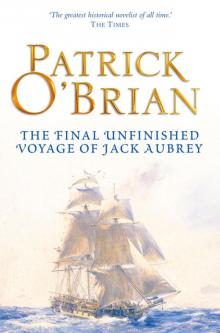 The Final Unfinished Voyage of Jack Aubrey
The Final Unfinished Voyage of Jack Aubrey The Rendezvous and Other Stories
The Rendezvous and Other Stories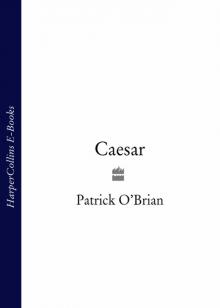 Caesar: The Life Story of a Panda-Leopard
Caesar: The Life Story of a Panda-Leopard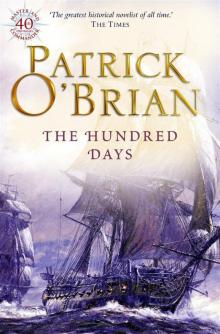 The Hundred Days
The Hundred Days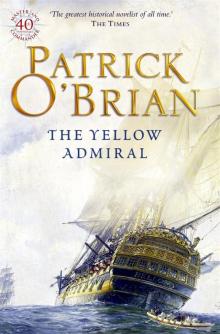 The Yellow Admiral
The Yellow Admiral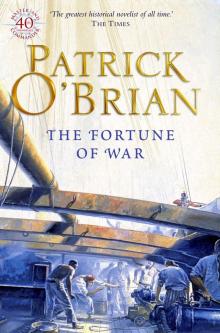 The Fortune of War
The Fortune of War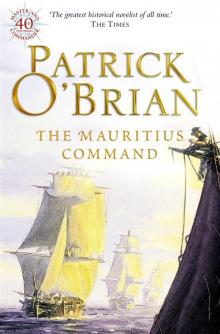 The Mauritius Command
The Mauritius Command Beasts Royal: Twelve Tales of Adventure
Beasts Royal: Twelve Tales of Adventure A Book of Voyages
A Book of Voyages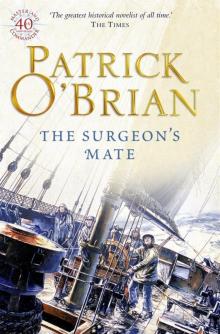 The Surgeon's Mate
The Surgeon's Mate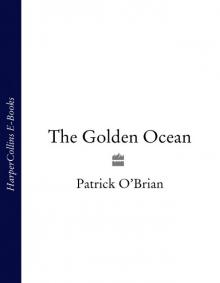 The Golden Ocean
The Golden Ocean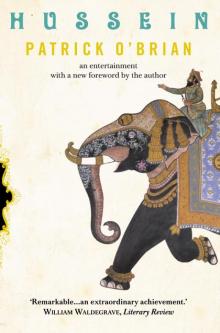 Hussein: An Entertainment
Hussein: An Entertainment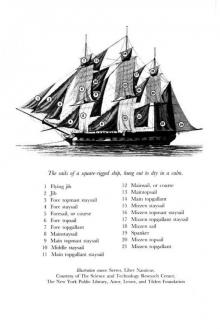 H.M.S. Surprise
H.M.S. Surprise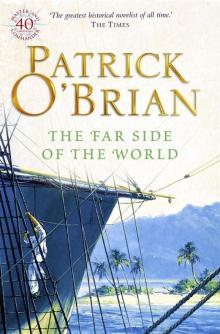 The Far Side of the World
The Far Side of the World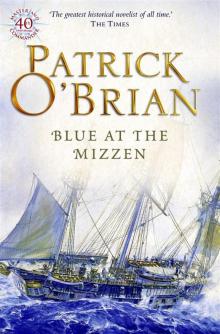 Blue at the Mizzen
Blue at the Mizzen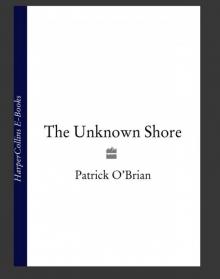 The Unknown Shore
The Unknown Shore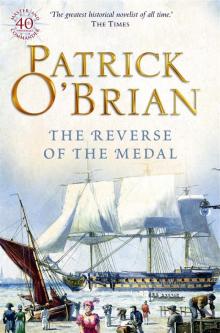 The Reverse of the Medal
The Reverse of the Medal Testimonies
Testimonies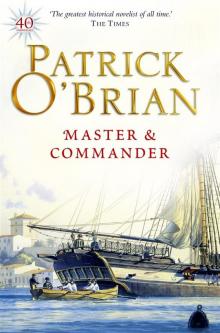 Master and Commander
Master and Commander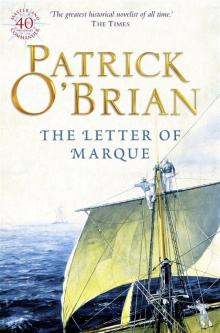 The Letter of Marque
The Letter of Marque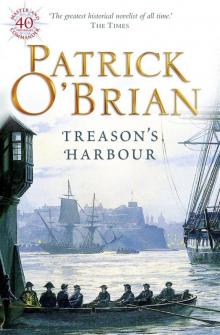 Treason's Harbour
Treason's Harbour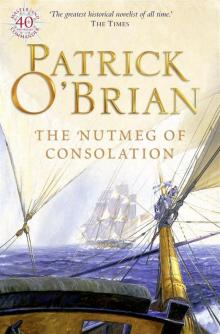 The Nutmeg of Consolation
The Nutmeg of Consolation 21: The Final Unfinished Voyage of Jack Aubrey
21: The Final Unfinished Voyage of Jack Aubrey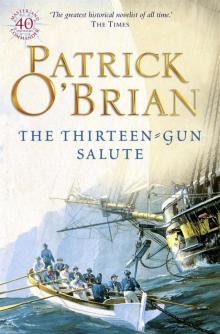 The Thirteen-Gun Salute
The Thirteen-Gun Salute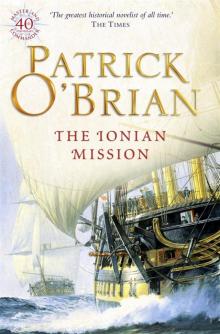 The Ionian Mission
The Ionian Mission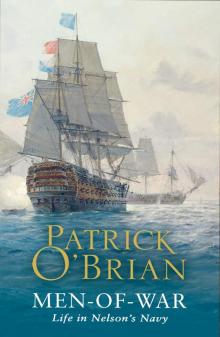 Men-of-War
Men-of-War The Commodore
The Commodore The Catalans
The Catalans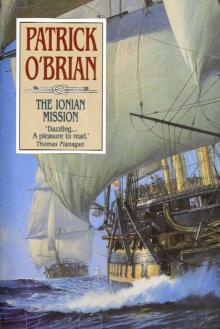 Aub-Mat 08 - The Ionian Mission
Aub-Mat 08 - The Ionian Mission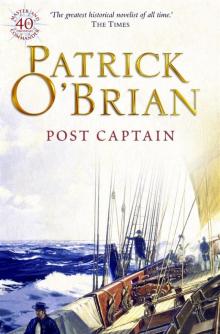 Post Captain
Post Captain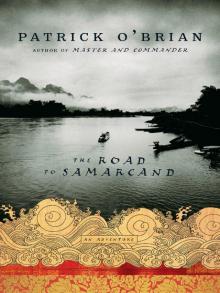 The Road to Samarcand
The Road to Samarcand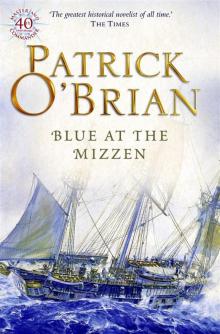 Book 20 - Blue At The Mizzen
Book 20 - Blue At The Mizzen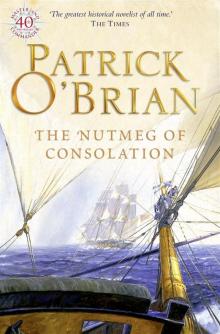 Book 14 - The Nutmeg Of Consolation
Book 14 - The Nutmeg Of Consolation Caesar
Caesar The Wine-Dark Sea
The Wine-Dark Sea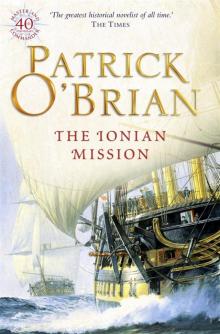 Book 8 - The Ionian Mission
Book 8 - The Ionian Mission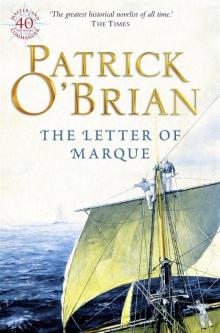 Book 12 - The Letter of Marque
Book 12 - The Letter of Marque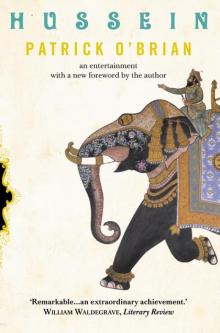 Hussein
Hussein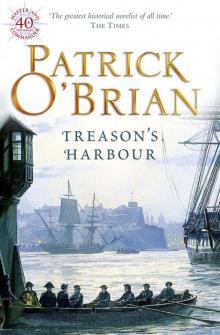 Book 9 - Treason's Harbour
Book 9 - Treason's Harbour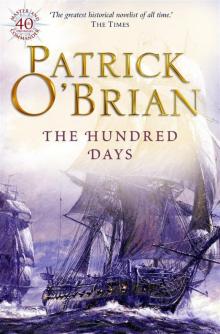 Book 19 - The Hundred Days
Book 19 - The Hundred Days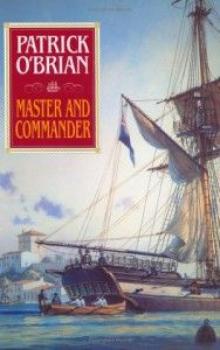 Master & Commander a-1
Master & Commander a-1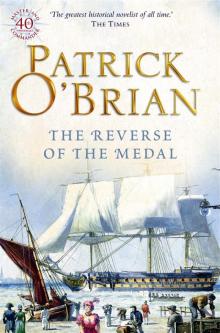 Book 11 - The Reverse Of The Medal
Book 11 - The Reverse Of The Medal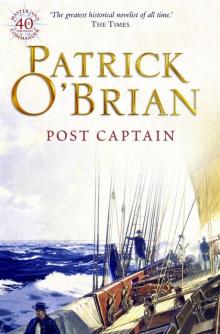 Book 2 - Post Captain
Book 2 - Post Captain The Truelove
The Truelove The Thirteen Gun Salute
The Thirteen Gun Salute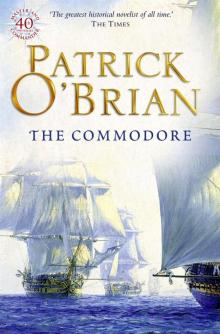 Book 17 - The Commodore
Book 17 - The Commodore The Final, Unfinished Voyage of Jack Aubrey
The Final, Unfinished Voyage of Jack Aubrey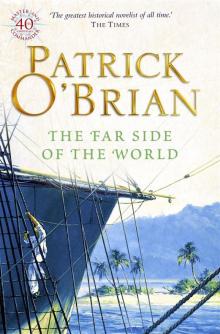 Book 10 - The Far Side Of The World
Book 10 - The Far Side Of The World Book 5 - Desolation Island
Book 5 - Desolation Island Beasts Royal
Beasts Royal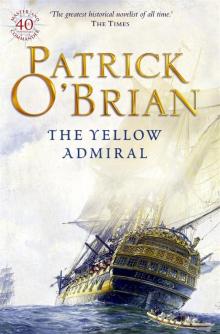 Book 18 - The Yellow Admiral
Book 18 - The Yellow Admiral Book 15 - Clarissa Oakes
Book 15 - Clarissa Oakes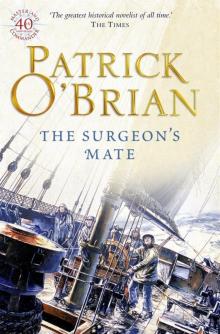 Book 7 - The Surgeon's Mate
Book 7 - The Surgeon's Mate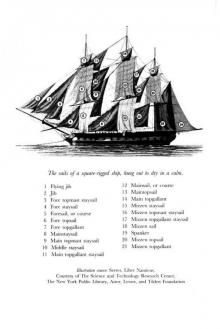 Book 3 - H.M.S. Surprise
Book 3 - H.M.S. Surprise Desolation island
Desolation island Picasso: A Biography
Picasso: A Biography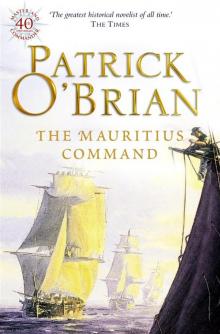 Book 4 - The Mauritius Command
Book 4 - The Mauritius Command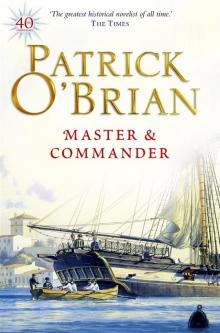 Book 1 - Master & Commander
Book 1 - Master & Commander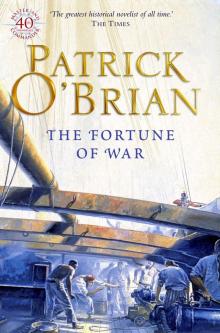 Book 6 - The Fortune Of War
Book 6 - The Fortune Of War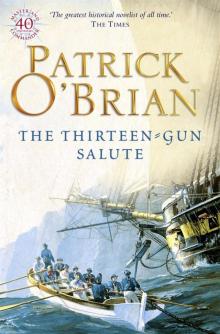 Book 13 - The Thirteen-Gun Salute
Book 13 - The Thirteen-Gun Salute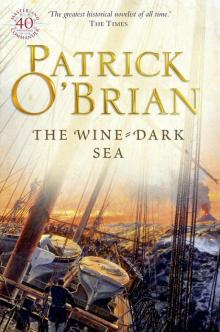 Book 16 - The Wine-Dark Sea
Book 16 - The Wine-Dark Sea